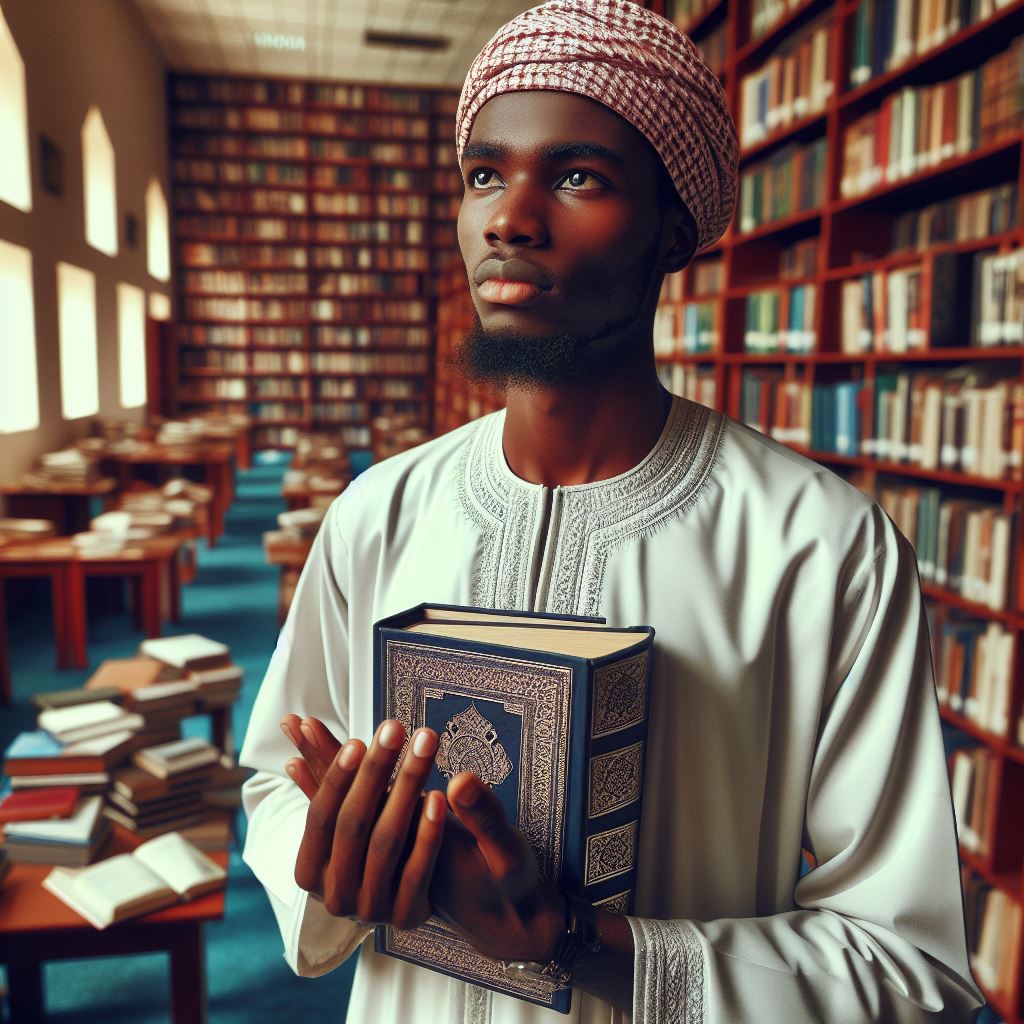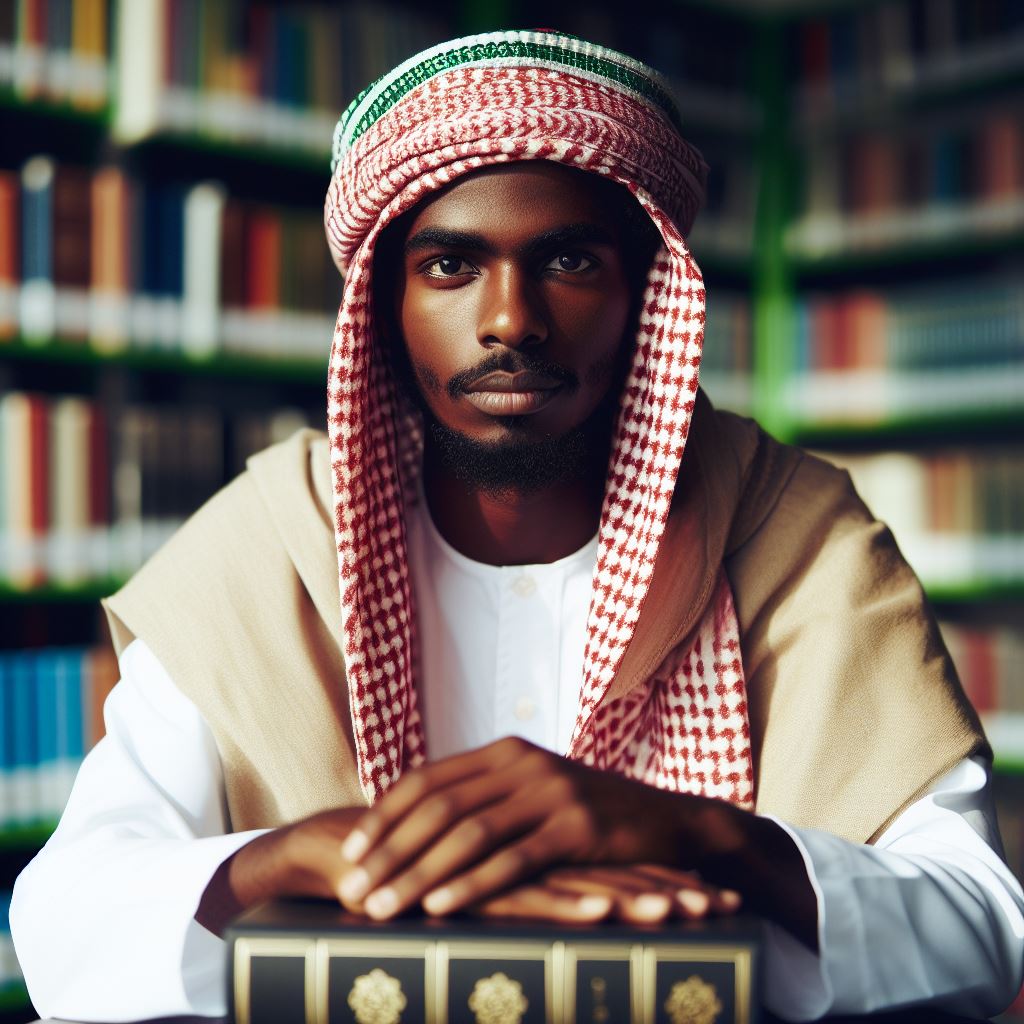Introduction
Islamic Studies plays a significant role in shaping Nigerian culture. It influences various aspects of daily life and societal norms. This field of study encompasses the teachings, history, and practices of Islam.
Brief Overview of Islamic Studies in Nigeria
Islamic Studies in Nigeria has a rich history. It began with the arrival of Islam in the 11th century. Islamic education institutions, such as madrasas, have been crucial in spreading knowledge. Today, universities offer advanced degrees in Islamic Studies.
Importance of Islamic Studies in Nigerian Culture
Islamic Studies is vital in preserving Nigerian cultural heritage. It ensures the continuation of religious practices and values.
It also promotes understanding and respect among different communities. Through Islamic education, ethical and moral teachings are imparted to the younger generation.
Impact of Islamic Studies on Nigerian Culture
Islamic Studies significantly impacts Nigerian culture by fostering religious tolerance and social cohesion. It shapes legal systems through Sharia law in Northern Nigeria.
Cultural practices, including festivals and rituals, are deeply influenced by Islamic teachings. Education in Islamic Studies empowers communities, promoting literacy and intellectual growth. By understanding its importance, we appreciate its profound influence on Nigerian culture.
Historical Perspective
- Influence of Islamic studies in pre-colonial Nigeria
- Spread of Islamic teachings through trade and migration
- Establishment of Islamic institutions in Nigeria
Influence of Islamic Studies in Pre-Colonial Nigeria
Islamic studies have played a significant role in shaping Nigerian culture throughout history.
During the pre-colonial era, the influence of Islamic teachings in Nigeria was profound.
Islamic scholars and traders brought Islam to the region, introducing new ideas and ways of life.
The teachings of Islam spread rapidly among the people, impacting various aspects of their culture.
The introduction of Islamic studies led to the adoption of Arabic language as a means of communication and education.
Mosques and madrasas were established in different regions, becoming centers for learning and worship.
Islamic principles, such as honesty, charity, and family values, became deeply rooted in Nigerian society.
The integration of Islamic studies into Nigerian culture paved the way for a harmonious coexistence of different ethnic groups.
Spread of Islamic Teachings Through Trade and Migration
Trade routes played a crucial role in the spread of Islamic teachings in Nigeria.
Arab traders traversing the Sahara Desert brought not only goods but also Islamic ideology to the region.
Through interactions with these traders, Nigerians were exposed to new beliefs and practices.
Migration also contributed to the dissemination of Islamic studies in Nigeria.
People from neighboring regions, such as North Africa and the Middle East, settled in Nigeria, bringing their Islamic traditions with them.
This cultural exchange enriched Nigerian society, creating a unique blend of Islamic and indigenous practices.
As a result, Islamic studies became deeply ingrained in the fabric of Nigerian culture, influencing art, music, literature, and social norms.
Establishment of Islamic Institutions in Nigeria
Islamic institutions played a vital role in the preservation and promotion of Islamic studies in Nigeria.
Madrasas, or Islamic schools, were established to educate young Nigerians on Islamic teachings and practices.
These institutions provided a formal education in Arabic language, Quranic recitation, and Islamic jurisprudence.
Students were taught to memorize the Quran and understand its meaning, instilling a deep sense of devotion and spirituality.
Leading scholars and theologians founded Islamic universities and colleges to further advance the study of Islamic theology and philosophy.
These institutions produced generations of Islamic scholars who became religious leaders and advocates for social change.
Overall, the establishment of Islamic institutions in Nigeria contributed to the preservation of Islamic heritage and traditions in the country.
Therefore, the impact of Islamic studies on Nigerian culture has been profound and enduring.
From the pre-colonial era to the present day, Islamic teachings have influenced various aspects of Nigerian society, shaping its values, beliefs, and practices.
The spread of Islamic studies through trade, migration, and the establishment of educational institutions has contributed to the rich tapestry of Nigerian culture, creating a diverse and vibrant society that embraces its Islamic heritage.
Read: Career Paths in Communication and Language Arts
Cultural Practices
When it comes to the impact of Islamic studies on Nigerian culture, one cannot overlook the significant influence it has had on various cultural practices in the country.
Adoption of Islamic practices in daily life
The adoption of Islamic practices in daily life by Nigerians has played a vital role in shaping the cultural landscape of the country. From daily prayers to the observance of fasting during Ramadan, these practices have become ingrained in the fabric of Nigerian society.
Islamic holidays and celebrations have also made a significant impact on Nigerian culture. Festivals such as Eid al-Fitr and Eid al-Adha are widely celebrated across the country, bringing communities together in joyous celebration.
Influence of Islamic holidays and celebrations on Nigerian culture
Moreover, the influence of Islamic dress code on Nigerian fashion cannot be understated. The modest and elegant styles of Islamic clothing have made their way into mainstream Nigerian fashion, with many designers incorporating elements of Islamic attire into their collections.
Impact of Islamic dress code on Nigerian fashion
Overall, the impact of Islamic studies on Nigerian culture has been profound, shaping various aspects of daily life, holidays, celebrations, and even fashion. This influence continues to be felt across the country, bridging cultural divides and creating a more interconnected society.
Read: Scholarships for Communication Arts Students in Nigeria
Language and Literature
- Incorporation of Arabic language in Nigerian culture
- Arabic language plays a significant role in Nigerian culture, especially in the northern region where Islam is predominant. The influx of Quranic education has led to the widespread use of Arabic in daily communication.
- Furthermore, Arabic is not only used for religious purposes but also for cultural events, traditional ceremonies, and even in business transactions. Its presence has become deeply rooted in Nigerian society, reflecting the influence of Islamic studies.
- Influence of Islamic literature on Nigerian literature
- The impact of Islamic literature on Nigerian literature is evident in various genres such as poetry, prose, and drama. Some of the earliest writings in Nigeria were inspired by Islamic teachings and values.
- Authors and poets have drawn inspiration from Islamic texts to create literary works that reflect the morals, beliefs, and traditions of the Nigerian people. This fusion of Islamic and Nigerian literature has enriched the country’s literary landscape.
- Importance of Quranic education in preserving Nigerian culture
- Quranic education plays a crucial role in preserving Nigerian culture by instilling moral values, promoting literacy, and fostering a sense of community among Muslims. Children are taught the Quran from a young age, which helps them develop a deep understanding of their faith.
- Moreover, Quranic education teaches students the Arabic language, providing them with a strong foundation for further studies and enhancing their cultural identity. The preservation of Nigerian culture through Quranic education ensures that traditional values and customs are passed down through generations.
Read: Leading Communication Arts Departments in Nigeria

Discover More: Scholarships for English Language Students in Nigeria
Social Structure
When it comes to the social structure in Nigeria, Islamic studies have played a significant role in shaping societal norms and values.
Role of Islamic Teachings in Shaping Societal Norms and Values
Islamic teachings emphasize values such as honesty, respect for elders, and compassion towards others. These principles have become integral parts of Nigerian culture.
Transform Your Career with Expert Guidance
Get personalized mentorship consulting that’s tailored to your unique path. Our expert advice is actionable and exclusive.
Get StartedInfluence of Islamic Principles on Family Structure in Nigeria
Islamic teachings stress the importance of strong family bonds, respect for parents, and care for children. These values have influenced the family structure in Nigeria.
Impact of Islamic Jurisprudence on Nigerian Legal System
Islamic law, known as Sharia, has had a significant impact on the legal system in some parts of Nigeria. It governs issues such as marriage, inheritance, and personal conduct.
In essence, Islamic studies have had a profound impact on Nigerian culture, influencing societal norms, family structures, and even the legal system.
Read: Comparing Communication Arts and Mass Communication
You Might Also Like: Studying International Relations: Nigerian Student Guide
Education and Scholarship
Contribution of Islamic scholars to Nigerian education
Islamic studies have played a significant role in shaping Nigerian culture through education and scholarship. It scholars in Nigeria have made invaluable contributions to the field of education, enhancing the overall academic landscape of the country.
Islamic scholars have been instrumental in establishing educational institutions that emphasize a holistic approach to learning, integrating moral values and critical thinking into the curriculum.
These institutions have served as centers of excellence, producing well-rounded individuals who are not only academically proficient but also grounded in ethical principles.
Role of Islamic studies in promoting critical thinking and moral values
Moreover, Islamic studies have played a crucial role in promoting critical thinking among students, encouraging them to question conventional wisdom and explore new ideas.
This emphasis on intellectual curiosity has led to a culture of innovation and creativity in Nigerian society, fostering a spirit of inquiry and discovery.
Influence of Islamic schools in preserving Nigerian cultural heritage
Additionally, Islamic schools have been instrumental in preserving Nigerian cultural heritage by teaching students about the rich history and traditions of the country.
By instilling a sense of pride in their cultural identity, these schools have helped to ensure that Nigerian heritage is passed down from generation to generation.
In a nutshell, Islamic studies have had a profound impact on Nigerian culture, particularly in the areas of education and scholarship.
Through the efforts of Islamic scholars and educational institutions, the values of critical thinking, moral integrity, and cultural preservation have been upheld and propagated, enriching the cultural fabric of the nation.
Find Out More: How Political Studies Shape Nigerian Electoral Processes
Find Out More: Job Opportunities for Communication Graduates in Nigeria
Find Out More: The Role of Economics in Nigeria’s Policy Making
Conclusion
Recap of the Impact of Islamic Studies on Nigerian Culture
Islamic Studies profoundly impacts Nigerian culture. It influences social values, education, and legal systems. These studies foster a deeper understanding of Islamic teachings. They also promote moral values and ethical behavior.
Call to Action for Further Research
Further research is necessary to explore the full impact of Islamic teachings in Nigeria. Scholars should delve deeper into historical and contemporary influences. This research will help address misconceptions and foster interfaith dialogue.
- Encourage academic institutions to support Islamic Studies programs.
- Promote interdisciplinary research on Islamic and Nigerian cultural intersections.
- Engage in community outreach to share findings with the public.
Final Thoughts on the Significance of Islamic Studies
Islamic Studies play a crucial role in preserving Nigerian cultural identity. They bridge historical traditions with modern societal needs. Understanding Islamic teachings enriches Nigerian cultural heritage.
Islamic Studies foster respect, unity, and cultural pride in Nigeria. They are essential for cultural preservation and societal development. Continued focus on these studies will benefit future generations.




